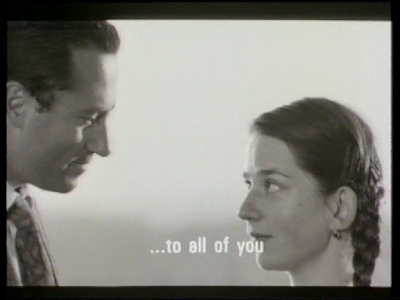MARTIN: Wenn ich mein Staatsexamen hab' komm'ich zurück zu dir...vielmehr - zu Ihnen. [Pause.] Wollen wir nicht Du sagen zueinander?Translating the shift from formal to informal address, which is standard in many languages but somehow not in English, is always tricky. (And not just in subtitling either. For a great discussion about this, sparked by an ingenious solution of Ros Schwartz's, see this languagehat post.)
SONJA: Doch, schon.
MARTIN: Ich heiß' Martin.
SONJA: Weiß schon...
A rough translation of Martin's remark would be something like: When I pass my state teaching exam, I'll come back to you [informal]...or rather [correcting himself] - to you [formal]. [Pause.] Can't we address each other as you [informal]?.
Multimodal elements of this scene will have to be taken into account. Kinetics, mise en scène, sound and rhythm may reinforce, undercut or otherwise inflect what's happening with the dialogue. A distinct change of mood occurs when Martin sees Sonja's secret framed photograph of him. He takes off his glasses. The scene opens with him standing while she sits. When he catches sight of the picture he crouches down to see better. She stands up so that she is momentarily taller than him; he stands and is again taller than her. His face is surprised, then serious; hers is quizzical. There's a short pause before he corrects Du to Sie and then a longer pause before he suggests that they call each other Du. All these things contribute to how the scene signifies, and may act as a guide (consciously or intuitively) to the subtitler.
Obviously, English uses the same word for both Du and Sie, so if transposed directly Martin's self-correction would make no sense, and there is no corresponding English expression for the question abut using Du.
The subtitler of this clip on the Miramax Youtube channel solves the problem as follows:
The subtitler changes the emphasis of Martin's line. Instead of correcting himself, he starts by saying that he will come back (implied, to the school), and then corrects himself that he will come back to her, specifically. You can see the whole clip here (it's at 2 mins 24 secs):
My 1992 VCI videocassette edition has, presumably, a different (unnamed) subtitler, and a different solution. The subtitler in fact has done the opposite of what the Miramax subtitler did:
This solution actually fits more closely with the dynamic of this scene, since he moves from a more intimate register (back to you) to a more 'formal' register in that 'to all of you' re-situates her as just a girl in his class. The long pause gives him time to gather his courage to request that they start using Du (and, by implication, that they begin a romantic relationship). The rather awkwardly formal 'Shall we be on Christian-name terms' is not out of keeping with the film's register.
So, a nice example of how opposite approaches by two translators can both work, in the moment.
More on translating formal and informal address, in a future post. Meanwhile if anybody has a copy of this film to hand, in any language, with a different subtitling solution, I'd love to hear about it.
UPDATE 20 August 2016: I rewrote and extended this post because on re-viewing the clips I realised I'd missed a couple of important things. (That will teach me to blog late at night.)
UPDATE 24 August 2016: The wonderful 20th-Century Flicks in Bristol turns out to have yet another subtitled version of the film, distributed by Arrow on Region 2 DVD (dated 2005). It has quite a different take on this scene again. The subtitles are by Lotti Mardell and Peter Templeton for SBS Australia, dated 2002:
This solution works very well to get across the levels of formality, though there's a lack of correspondence between the audio, where the proper names are not heard, and the subtitles. The trade-off seems worth it in this instance.
Any more versions out there...? Any information that might help me identify the subtitlers of the first two versions?









No comments:
Post a Comment